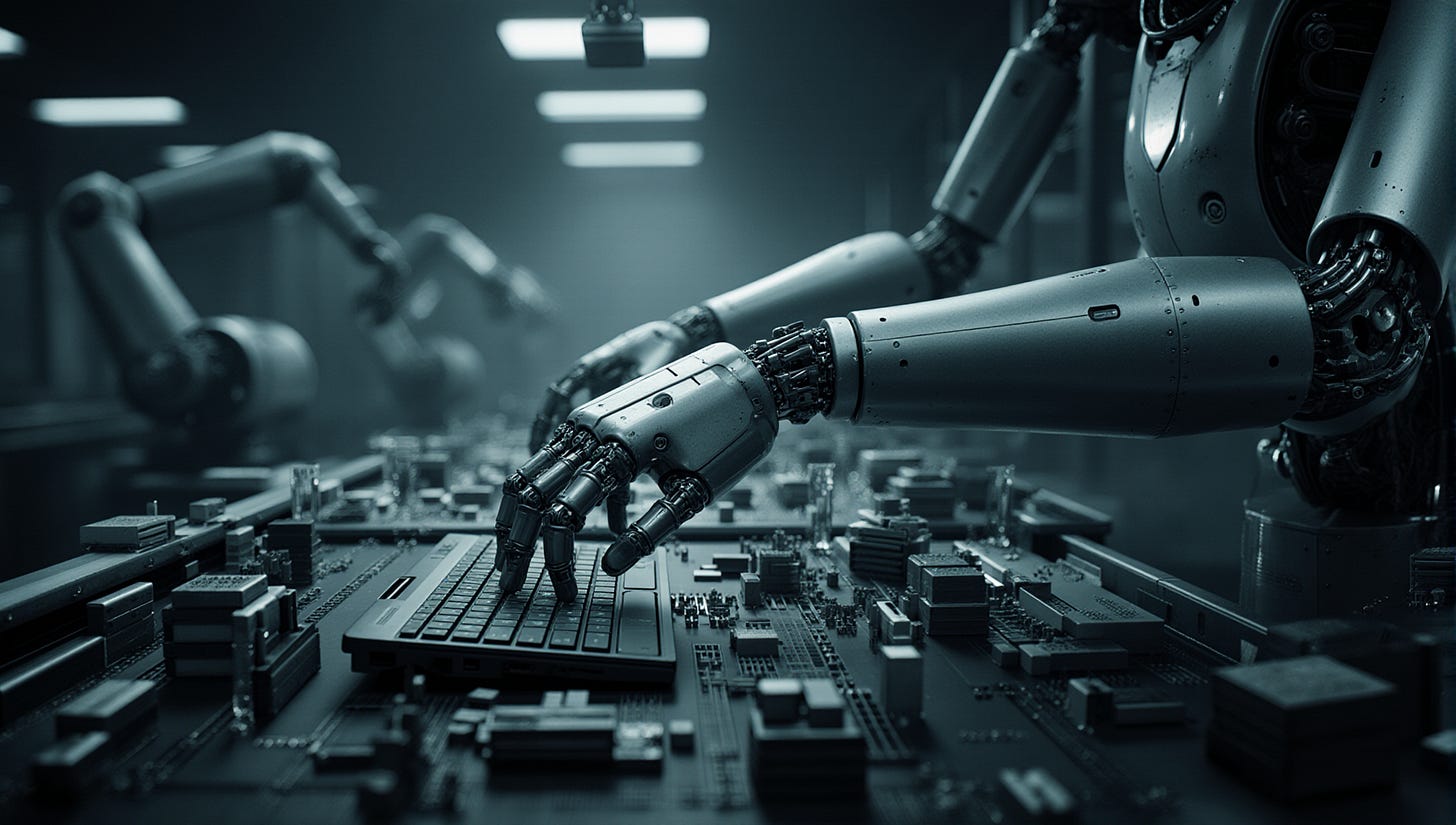When, in a recent lecture on Artificial Intelligence, I concluded that Digitalisation must be classified among the great humiliations that Freud identified in his Civilisation and Its Discontents— no, it is even worse than that because it isn’t just a wobble in our worldview, but a shock that is materially affecting the lives of every single person—the question arises: why are the debates on this topic still so extremely vague and imprecise? Comparing this with the exemplars cited by Freud (the Copernican revolution, Darwin’s theory of evolution, the Unconscious itself), the distinction becomes even more apparent. While this logic’s gravity leaves little room for diverse interpretations, let alone phantasmal projections, Digitalisation is fundamentally different. When even self-proclaimed experts in the field (such as Ray Kurzweil) lose themselves in quasi-religious speculation, it's hardly surprising when the discourse oscillates between curse and blessing, what religious scholar Rudolph Otto so aptly called mysterium tremens et mysterium fascinans, the question becomes: How is it possible that such a worldly technology is comprehended as something numinous? The answer is that the computer, as a Universal Machine, is not a tool in the classical sense ( making it impossible to philosophize with a hammer here), but rather a space with multiple overlapping layers – resulting in some things being consigned to oblivion. For this reason, discussions on the topic often derail with beautiful regularity—after all, things are being lumped together that don’t belong together. Because the Machine is experienced as a magic box and black box, people can fall into the trap of believing that a primitive Markov chain, which is nothing more than a well-trodden path of human decisions, is an algorithm devised by Artificial Intelligence. That all the categories are wildly mixed up here makes a serious debate about the social consequences of AI extremely complicated— inevitably, we are faced with a mixture of magical thinking, incantations, and sheer ignorance. So, before we turn to the great humiliation that the working world is about to face, let's try to distinguish between its individual driving forces. The first point—and the reason why I began my Short History of Digitalisation with it—is relatively trivial: the starting point of the digitalised world is the electrification of society. If this allows for a form of remote interaction—telematics—then it can also be understood as the beginning of mass society, like a childhood memory of walking through the streets of my hometown during the 1966 World Cup final and hearing a simultaneous cry ringing out from the ghostly glow of televisions behind every window imaginable: Goal! It’s in this sense that electricity marks the advent of modern mass society. What’s more, it changes what can be considered Writing from then on. Because when everything that can be electrified can be stored in electromagnetic form, it’s impossible not to see this as a complete unleashing of our notion of Writing. When people today, like the petitioners of the Manifesto for Human Language, believe that contemporary Writing consists of only the letters of the Alphabet, they demonstrate an outdatedness falling back even beyond the 18th Century.1 Coming to the second point: if everything imaginable can be written down, complex processes and routines can be recorded. Spelling this out, it means that society is now confronted with a Museum of Work, since any work that has been digitalised can be transferred into a program. Because digitalised logic, according to the basic formula x=xn, allows for the proliferation of this program at will, and because telematics makes its distribution accessible everywhere, the result is that the program in question can be accessed anywhere and anytime: Anything, Anytime, Anywhere. Musicians can tell us a thing or two about how digital streaming has affected music production and record sales. It is foreseeable that the creed of classical capitalism (the assertion that humans live on a planet of scarcity) is obsolete—that, instead, we are dealing with an economy of abundance. The third point, which slowly introduces us to the world of artificial intelligence, has to do with the fact that every human interaction is transformed into data, and that all of this data can be used for pattern recognition, meaning that certain thought and behavior patterns can be translated into models. If you train a machine to recognise how different people handle a complex device (such as a car or construction machinery) for long enough, then at some point, a robot will also be able to perform this task.
And with that, we arrive at the present day, which is suddenly facing this complex situation simply because AI models are becoming so powerful and inexpensive that human labour cannot compete with them. The consequences are already foreseeable: The Stepstone Group reports that entry-level positions are experiencing a slump, suddenly falling 45% below the five-year average. It doesn’t take much imagination to picture the oncoming transformation of the working world. If you can delegate the tedious research work that an assistant would have otherwise done to an AI agent, if the secretary who takes care of appointments, travel arrangements, or the like, can be replaced by artificial intelligence – and when, finally, the colleague who took care of the minutes, position papers, and communication with the outside world finds a more than equal competitor in ChatGPT or Anthropics Claude, the decision-maker may end up all alone in their home office. And if you consider that even a company’s external image, which until recently was handled by graphic designers, web designers, and programmers, can now be entrusted to AI, just as a chatbot can handle customer service, it’s easy to imagine company structures in which a handful of people develop tremendous clout. Freed from social friction and the hardships associated with delegating tasks, those somewhat awkwardly labelled as service providers2, can now expand this role more freely. It is evident that a completely new model of what used to be called a »company« or »corporation« is emerging here. With over 2 million square meters of office space currently vacant in Berlin and commercial rents reaching record levels, it is evident that a company operating its business from a home office – or even better: from the cloud – can claim a significant advantage. Whereas in the limbo economy of the 2000s, people talked about the location advantage, today we should be preaching the location-less advantage, the virtuality that has left not only place but also human labour behind. When critics of Silicon Valley (such as Yannis Varoufakis) have spoken of a new form of techno-feudalism, this has to do with how, according to the logic of x = xn, companies can scale at will (which is why the formula should actually look like this: x ⇒ xn), while the »Natural Man« (the needy capital, as Marx called him) must necessarily lag behind. Now, this class antagonism is becoming inscribed in the working class, and as such—in the near future, we will see those who have personal agents working for them standing out from those unversed in this art or, worse still, who have fallen victim to its inevitable rationalization.
What makes the situation so explosive, if not a social powder keg, is that the long-overdue discussions about what exactly constitutes the digitalised revolution’s explosive force haven’t even begun. Had an attempt been made, we would have already confronted the question of how and why this revolution is disrupting our understanding of what work and performance are and what the novelty, indeed the very concept of the digitalised, consists of. That people have instead indulged in fantasies such as Data Sovereignty and otherwise excelling in Moral Grandstanding is nothing less than a first-rate generational failure. Looking at the current classe politique, it’s obvious they are completely unprepared, that we are ultimately dealing with a cohort of sleepwalkers. And this fills me, who wholeheartedly welcomes the rational side of this new world, with a great shudder when it comes to socio-political issues—after all, here we are dealing with a situation that is even more serious than what assembly lines, financial crises, and depressions of the last century imposed on societies. When service providers account for more than 75% of the workforce compared to just 1.2% working in agriculture, and when you realise that a good 80% of service sector activities could disappear into the museum of work, then you know that a single spark is enough to ignite a revolution.
In fact, one of the authors was moved to make the bold statement that it cannot be that the digitalised world functions differently from the analogue world – a statement which, when one considers cultural history, could also be used as an argument against the Alphabet, since it emits signs that, unlike the »Natural World«, don’t perish. This rejection of contemporary writing also has an impact on style and thinking, as the manifesto bluntly asserts: »Literary translators are already experiencing how the automation of intellectual work and human language is affecting their work and society as a whole: Art, but also Democracy, is under threat.«
The shift in meaning of the word is quite illuminating. In the past, the term service provider referred to an authority, such as one that pays out social benefits, whereas the focus on active assets in the work process is a more recent development.
Related Content
A Short History of Digitalization
To assist our readers, both old and new, in gaining a better understanding of what makes Burckhardtian thinking so relevant to the enigmas of our current world, we’ve decided to serialize our English translation of Eine kurze Geschichte der Digitalisierung
From the Abuse Value
As already laid out in this series exploring Martin’s œuvre, he began his writing career questioning what a computer was, laying out the groundwork of those early thoughts in his first published article titled Digitale Metaphysik. He followed this with
In the Working Memory
In the early 1980s, Martin Burckhardt, a young, aspiring writer, completed his Master’s thesis on Walter Mehring and Dadaism. After writing his first radio play in which he’d gathered a group of Dadaists in an old folk home and called for the death of modernity, he soon found himself working in the recording studio with Johannes Schmölling, who’d recent…







